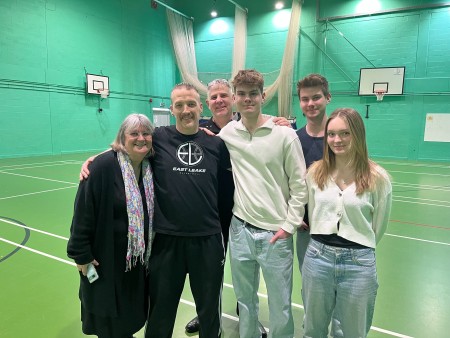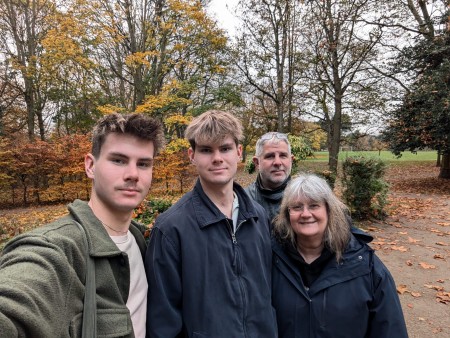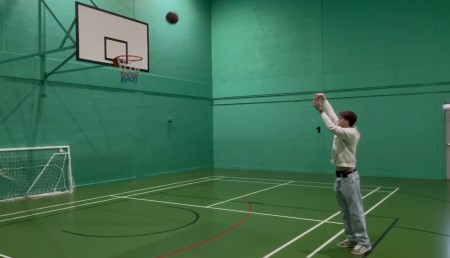On the evening of Monday 12 February 2024, 17-year-old Jack Taylor had just arrived at East Leake Leisure Centre with friends to play basketball. Minutes later he collapsed, and it was identified he was in cardiac arrest.
While one of his friends was on the phone to 999 to request emergency help, off-duty British Red Cross First Aid Instructor, Jamie Perridge, sprang into action.
In addition to his full-time role at the British Red Cross, Jamie is also a first responder for Central Medical Services, a 24/7 private ambulance and medical service provider for both the NHS and private clients.
That evening, he was running the basketball club.

Front left to right front: Andrea Cox, Jamie Perridge, Jack Taylor and his girlfriend Lucy. Back left to right: Jack's dad Rik and his twin brother Max.
Jamie said: “I was at the other side of the sports hall putting my trainers on when I saw in the corner of my eye, Jack fall to the ground.
“I initially thought Jack had rolled his ankle when I went over to check on him, but as I got closer, I could see him starting to shake and he was having a seizure.
“I instructed a friend to get a stopwatch to record the length of the seizures.”
Jamie then identified another person on scene to act as a ‘runner’ down to reception to make them aware that emergency crews were coming, so they could open a side gate to allow for quick and immediate access to the site.
He added: “While Jack wasn’t in cardiac arrest at that stage, I asked a gym instructor to get the defibrillator we had on site so we could be prepared to shock his heart if that did happen.
“As she came back with the defibrillator, Jack started to turn blue. He had gone into cardiac arrest, so I performed cardio-pulmonary resuscitation (CPR) on his chest until the defib advised to give a shock.
“The leisure centre staff were amazing – they not only fetched the defibrillator but also helped deliver CPR and operate the defibrillator.
“I think we gave him eight shocks in total before the ambulance crew arrived.”

Jack and his family make the most of every moment following what happened.
As those on scene were doing everything possible to give Jack a fighting chance of survival, EMAS received the 999 call into the control room.
Emergency Medical Advisor Clare Davis took the details from the caller, while Dispatcher Richard Skelton ensured we had the appropriate resources sent to Jack in a timely manner.
Richard said: “As a dispatcher I am familiar with the clinicians we had on shift. It was my job to strategically resource the right mix of skills that Jack required.
“The call for Jack was a Category 1 (immediately life-threatening), so I was looking to get the nearest appropriate crews to him as quickly as possible.
“As we got more information that Jack was in cardiac arrest, I knew we needed a multi-team response from EMAS and the Derbyshire, Leicestershire & Rutland Air Ambulance – operated by The Air Ambulance Service (TAAS).
“This consisted of a doctor, paramedics, a critical care paramedic, and a cardiac arrest lead, so we could manage Jack’s care properly when we arrived.”
The EMAS ambulance crew of Julia Jabrzyk and Adrian Rea had just handed over their previous patient at hospital when they received a call to attend a patient in cardiac arrest, with bystander CPR already being performed at the scene.
Adrian said: “When we arrived, we managed Jack’s airway and continued to perform CPR.
“We were then joined by George Duffin and Mark Stephens from EMAS and Tom Eckersley and Stephen Smith from the Derbyshire, Leicestershire & Rutland Air Ambulance Service (DLRAA) to coordinate advanced life support.
“Thanks to Jamie’s quick action when Jack’s cardiac arrest started, and our team working together to manage his condition, we were able to get his heart beating again.
“As a team, we decided the best course of action was to sedate Jack, place a tube in his airway to help him breathe, and take him to Glenfield Hospital in Leicester.
“The doctor from TAAS who arrived on scene in a critical care car, travelled with us in the ambulance to ensure we could continue to provide Jack with ongoing care on the way to hospital.”
Julia added: “The fact that the leisure centre had a defibrillator available, and that Jamie and others were willing to use it while doing chest compressions, made all the difference in saving Jack’s life before we could step in to help.”
While all this was happening, Jack’s mother Andrea Cox, got the phone call every parent dreads.
Andrea said: “There were no words to describe that moment.
“No-one on the scene with Jack had my number, so they phoned his girlfriend, and her mum then called Max, Jack’s twin brother who spoke to me to break the news.
“They had given my number to the police who stayed on the phone with me until two police officers turned up at our house in Arnold, who then swifty took us to the hospital so we could be with Jack.
“When I saw him, he had all these pipes in him, and he was unconscious – it was a very scary moment to see your child like that.”
For several days, Jack was under the constant care from a team of specialists in the Intensive Therapy Unit at Glenfield. He remained critically ill and needed close monitoring, along with advanced medical support like ventilators, intensive nursing, and a life-support machine.
Andrea added: “Jack’s lungs were filling up with blood and he had a severe chest infection due to a damaged mitral heart valve.
“After nine days, he was transferred to Harefield Hospital in London where a huge team was formed around his care.
“Instead of a heart transplant, he underwent a groundbreaking mitral valve repair – a completely unique and groundbreaking procedure pioneered by his surgeon, Fabio de Robertis.
“Fabio told us that Jack had a rare condition called hypertrophic cardiomyopathy, a genetic disease where the heart muscles become thickened.
“Jack had an 8% chance of survival and a 2% chance of keeping his own heart.”
Despite spending months at Harefield, which included his 18th birthday, Jack beat both those odds and is back at home and even works a part-time job.
He has an implantable cardioverter defibrillator (ICD) fitted. The ICD is a small, battery-powered device that monitors and regulates Jack’s heart rhythm and delivers electrical pulses to correct any abnormalities. If needed in future, it can also send a larger electrical shock to his heart to “reboot” it and restore a normal rhythm.
Looking to the future, Jack will commence his studying in Software Engineering at Nottingham Trent University from September.

Jack takes a shot at the net in the sports hall where he has his cardiac arrest.
Speaking of this next chapter in his life, Jack said: “I’m really excited because it’s a subject I’ve always wanted to study, but I’m worried about my memory.”
Due to the cardiac arrest, Jack sustained a hypoxic brain injury which affects his short-term memory. He is undergoing neurological rehabilitation at Queen’s Medical Centre in Nottingham.
Jack continued: “Still, if I enjoy it, I think it’ll be a great challenge. The exam board even gave me a letter of recognition to show what A Level results they think I’d have got, based on my academic progress before my cardiac arrest, which ensured I got my place at university.”
Top tips
A medical emergency involving the heart, such as a cardiac arrest or a heart attack can happen to anyone at any time.
A cardiac arrest (what happened to Jack Taylor) is when your heart suddenly stops pumping blood around your body. Although it is sometimes mistaken for a heart attack, if someone is in cardiac arrest they collapse suddenly and will be unconscious, unresponsive, and not breathing or breathing normally – this may mean they’re making gasping noises.
A heart attack happens when there’s a sudden loss of blood flow to a part of the heart muscle. This causes symptoms such as pain or a feeling of pressure or a burning in the chest. Someone having a heart attack is usually conscious.
Both a cardiac arrest and a heart attack are medical emergencies, and you should call 999 straight away.
While we don’t want to scare people, it is important to consider the following tips to help increase yours and others’ chances of survival should the worst happen:
Cardiac arrest
- Learn how to do CPR – receiving CPR within the first three to four minutes of a cardiac arrest is crucial in terms of maximising the chances of survival and reducing the risk of the person living with a brain injury if they do survive. The British Heart Foundation also has really helpful resources on CPR and defibrillators.
- When calling 999 for someone who is in cardiac arrest, in addition to being advised to perform CPR, if there is someone else with you, they may be advised to go and fetch a public access defibrillator if we identify an available one nearby. They are often in places like train stations, schools, and shopping centres. Anyone can use one and you don’t need training to do so.
Heart attack
- If you’re experiencing chest pains, try not to exert yourself physically unnecessarily, such as going upstairs to bed if you’re already downstairs – instead lay yourself down on the sofa. Most chest pain is not a sign of anything serious but you should get medical advice just in case. If the pain gets worse (makes your chest feel tight or heavy) or rapidly starts progressing to other parts of the body eg arms, back, neck or jaw – this could be a heart attack. If this happens, call 999 and remain downstairs so the responding ambulance crew will have easy access to you.
- If you have had a heart attack, it's important that you rest while you wait for an ambulance, to avoid unnecessary strain on your heart. When you call 999, the Emergency Medical Advisor may advise you to take aspirin for this chest pain. Aspirin helps to thin your blood and improve blood flow to your heart.